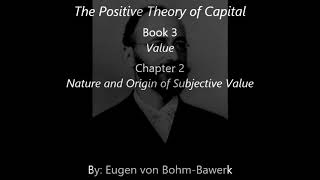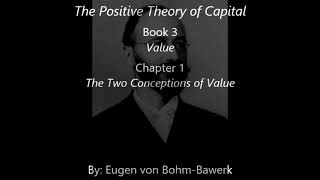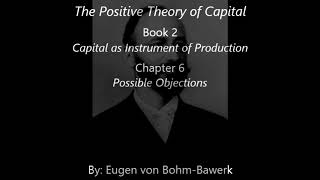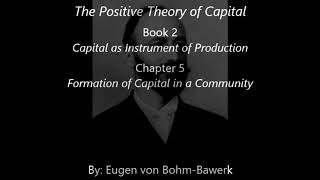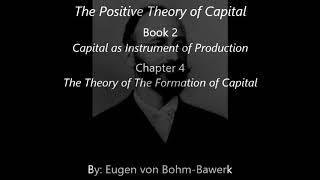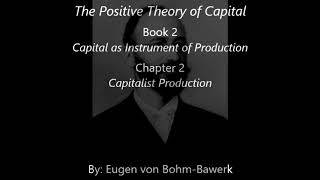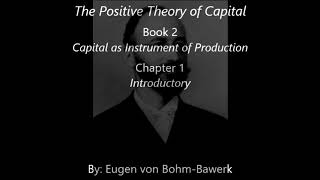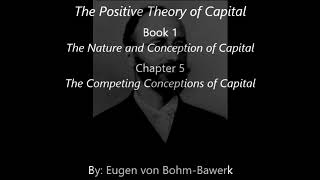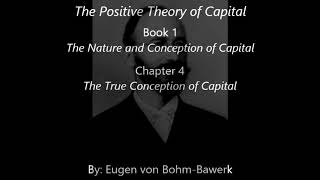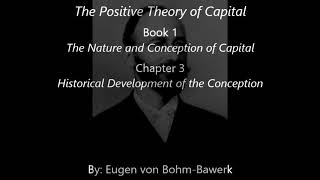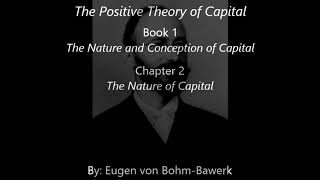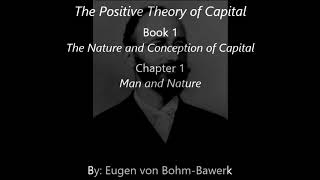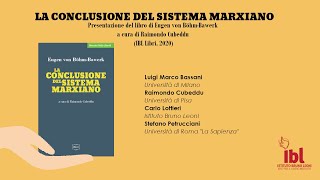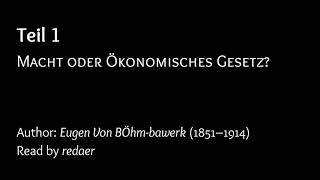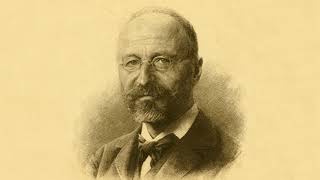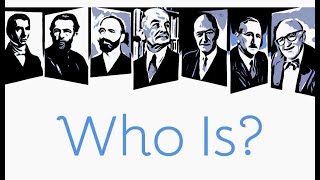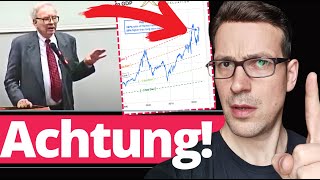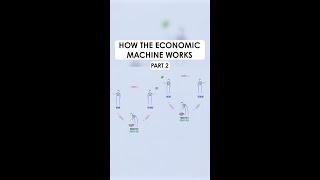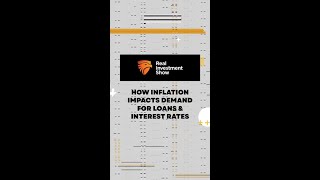Category Archive: 6b.) Bawerk
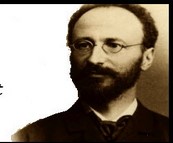
Eugen von Bohm-Bawerk: The Positive Theory of Capital: Book 3: Chapter 2
The Positive Theory of Capital:
Book 3: Value
Chapter 2: Nature and Origin of Subjective Value
Eugen von Bohm-Bawerk (1851 - 1914) was an Austrian Economist, who was influenced by Carl Menger, and served as the Austrian Minister of Finance between 1895 and 1904. In the book The Positive Theory of Capital Eugen brings up six sections: Capital as an Instrument of Production, Value, Price, Present and Future, The Source of Interest, and The Rate of...
Read More »
Read More »
Eugen von Bohm-Bawerk: The Positive Theory of Capital: Book 3: Chapter 1
The Positive Theory of Capital:
Book 3: Value
Chapter 1: The Two Conceptions of Value
Eugen von Bohm-Bawerk (1851 - 1914) was an Austrian Economist, who was influenced by Carl Menger, and served as the Austrian Minister of Finance between 1895 and 1904. In the book The Positive Theory of Capital Eugen brings up six sections: Capital as an Instrument of Production, Value, Price, Present and Future, The Source of Interest, and The Rate of Interest....
Read More »
Read More »
Eugen von Bohm-Bawerk: The Positive Theory of Capital: Book 2: Chapter 6
The Positive Theory of Capital:
Book 2: Capital as Instrument of Production
Chapter 6: Possible Objections
Eugen von Bohm-Bawerk (1851 - 1914) was an Austrian Economist, who was influenced by Carl Menger, and served as the Austrian Minister of Finance between 1895 and 1904. In the book The Positive Theory of Capital Eugen brings up six sections: Capital as an Instrument of Production, Value, Price, Present and Future, The Source of Interest, and...
Read More »
Read More »
Eugen von Bohm-Bawerk: The Positive Theory of Capital: Book 2: Chapter 5
The Positive Theory of Capital:
Book 2: Capital as Instrument of Production
Chapter 5: Formation of Capital in a Community
Eugen von Bohm-Bawerk (1851 - 1914) was an Austrian Economist, who was influenced by Carl Menger, and served as the Austrian Minister of Finance between 1895 and 1904. In the book The Positive Theory of Capital Eugen brings up six sections: Capital as an Instrument of Production, Value, Price, Present and Future, The Source of...
Read More »
Read More »
Eugen von Bohm-Bawerk: The Positive Theory of Capital: Book 2: Chapter 4
The Positive Theory of Capital:
Book 2: Capital as Instrument of Production
Chapter 4: The Theory of the Formation of Capital
Eugen von Bohm-Bawerk (1851 - 1914) was an Austrian Economist, who was influenced by Carl Menger, and served as the Austrian Minister of Finance between 1895 and 1904. In the book The Positive Theory of Capital Eugen brings up six sections: Capital as an Instrument of Production, Value, Price, Present and Future, The Source...
Read More »
Read More »
Znani ekonomiści w kwadrans – pytania i odpowiedzi: Menger, Böhm-Bawerk, Schumpeter
Dr hab. Mateusz Machaj odpowiada na Wasze pytania dotyczące Carla Mengera, Eugena von Böhm-Bawerka i Josepha Schumpetera.
Jeśli chcesz więcej webinarów, wesprzyj Instytut darowizną: https://mises.pl/przekaz-darowizne/
Read More »
Read More »
Eugen von Bohm-Bawerk: The Positive Theory of Capital: Book 2: Chapter 3
The Positive Theory of Capital:
Book 2: Capital as Instrument of Production
Chapter 3: The Function of Capital in Production
Eugen von Bohm-Bawerk (1851 - 1914) was an Austrian Economist, who was influenced by Carl Menger, and served as the Austrian Minister of Finance between 1895 and 1904. In the book The Positive Theory of Capital Eugen brings up six sections: Capital as an Instrument of Production, Value, Price, Present and Future, The Source...
Read More »
Read More »
Eugen von Bohm-Bawerk: The Positive Theory of Capital: Book 2: Chapter 2
The Positive Theory of Capital:
Book 2: Capital as Instrument of Production
Chapter 2: Capitalist Production
Eugen von Bohm-Bawerk (1851 - 1914) was an Austrian Economist, who was influenced by Carl Menger, and served as the Austrian Minister of Finance between 1895 and 1904. In the book The Positive Theory of Capital Eugen brings up six sections: Capital as an Instrument of Production, Value, Price, Present and Future, The Source of Interest, and...
Read More »
Read More »
Eugen von Bohm-Bawerk: The Positive Theory of Capital: Book 2: Chapter 1
The Positive Theory of Capital:
Book 2: Capital as Instrument of Production
Chapter 1: Introductory
Eugen von Bohm-Bawerk (1851 - 1914) was an Austrian Economist, who was influenced by Carl Menger, and served as the Austrian Minister of Finance between 1895 and 1904. In the book The Positive Theory of Capital Eugen brings up six sections: Capital as an Instrument of Production, Value, Price, Present and Future, The Source of Interest, and The Rate...
Read More »
Read More »
Eugen von Bohm-Bawerk: The Positive Theory of Capital: Book 1: Chapter 6
The Positive Theory of Capital:
Book 1: The Nature and Conception of Capital
Chapter 6: Social and Private Capital
Eugen von Bohm-Bawerk (1851 - 1914) was an Austrian Economist, who was influenced by Carl Menger, and served as the Austrian Minister of Finance between 1895 and 1904. In the book The Positive Theory of Capital Eugen brings up six sections: Capital as an Instrument of Production, Value, Price, Present and Future, The Source of...
Read More »
Read More »
Eugen von Bohm-Bawerk: The Positive Theory of Capital: Book 1: Chapter 5
The Positive Theory of Capital:
Book 1: The Nature and Conception of Capital
Chapter 5: The Competing Conceptions of Capital
Eugen von Bohm-Bawerk (1851 - 1914) was an Austrian Economist, who was influenced by Carl Menger, and served as the Austrian Minister of Finance between 1895 and 1904. In the book The Positive Theory of Capital Eugen brings up six sections: Capital as an Instrument of Production, Value, Price, Present and Future, The Source...
Read More »
Read More »
Eugen von Bohm-Bawerk: The Positive Theory of Capital: Book 1: Chapter 4
The Positive Theory of Capital:
Book 1: The Nature and Conception of Capital
Chapter 4: The True Conception of Capital
Eugen von Bohm-Bawerk (1851 - 1914) was an Austrian Economist, who was influenced by Carl Menger, and served as the Austrian Minister of Finance between 1895 and 1904. In the book The Positive Theory of Capital Eugen brings up six sections: Capital as an Instrument of Production, Value, Price, Present and Future, The Source of...
Read More »
Read More »
Kwadrans z Eugenem von Böhm-Bawerkiem
Dr hab. Mateusz Machaj opowiada o dorobku Eugena von Böhm-Bawerka (1851-1914) w piętnaście minut. Dowiesz się m.in., dlaczego był największym ekonomistą swoich czasów, jak intelektualnie zniszczył teorie Marksa i Marshalla oraz jak zapoczątkował ekonomiczną analizę interwencji państwa w gospodarkę.
Weź udział w wyjątkowej akcji EKONOMIA+! https://wesprzyj.mises.pl/
Jeśli chcesz więcej takich materiałów, wesprzyj Instytut Misesa darowizną:...
Read More »
Read More »
Eugen von Bohm-Bawerk: The Positive Theory of Capital: Book 1: Chapter 3
The Positive Theory of Capital:
Book 1: The Nature and Conception of Capital
Chapter 3: Historical Development of the Conception
Eugen von Bohm-Bawerk (1851 - 1914) was an Austrian Economist, who was influenced by Carl Menger, and served as the Austrian Minister of Finance between 1895 and 1904. In the book The Positive Theory of Capital Eugen brings up six sections: Capital as an Instrument of Production, Value, Price, Present and Future, The...
Read More »
Read More »
Eugen von Bohm-Bawerk: The Positive Theory of Capital: Book 1: Chapter 2
The Positive Theory of Capital:
Book 1: The Nature and Conception of Capital
Chapter 2: Man and Nature
Eugen von Bohm-Bawerk (1851 - 1914) was an Austrian Economist, who was influenced by Carl Menger, and served as the Austrian Minister of Finance between 1895 and 1904. In the book The Positive Theory of Capital Eugen brings up six sections: Capital as an Instrument of Production, Value, Price, Present and Future, The Source of Interest, and The...
Read More »
Read More »
Eugen von Bohm-Bawerk: The Positive Theory of Capital: Book 1: Chapter 1
The Positive Theory of Capital:
Book 1: The Nature and Conception of Capital
Chapter 1: Man and Nature
Eugen von Bohm-Bawerk (1851 - 1914) was an Austrian Economist, who was influenced by Carl Menger, and served as the Austrian Minister of Finance between 1895 and 1904. In the book The Positive Theory of Capital Eugen brings up six sections: Capital as an Instrument of Production, Value, Price, Present and Future, The Source of Interest, and The...
Read More »
Read More »
La conclusione del sistema marxiano – Presentazione del libro (IBL Libri 2020)
La conclusione del sistema marxiano
di Eugen von Böhm-Bawerk, a cura e con un saggio introduttivo di Raimondo Cubeddu
(IBL Libri, 2020 - brunoleoni.it/la-conclusione-del-sistema-marxiano)
Presentazione online del libro
Intervengono:
Luigi Marco Bassani (professore ordinario di Storia delle dottrine politiche, Università di Milano)
Raimondo Cubeddu (professore ordinario di Filosofia politica, Università di Pisa)
Stefano Petrucciani (professore...
Read More »
Read More »
Macht oder Ökonomisches Gesetz? (Eugen Von BÖhm-bawerk) [Full AudioBook]
Macht oder Ökonomisches Gesetz? by Eugen Von BÖhm-bawerk (1851 - 1914)
00:00:00 Teil 1
00:38:06 Teil 2 - II
01:21:13 Teil 3 - III
02:06:09 Teil 4
02:44:03 Teil 5 - IV
03:20:12 Teil 6
04:02:43 Teil 7
Copyright: CC. Both the book and the audio are in the public domain. The audio is the records of Librivox.
Read More »
Read More »
Uncovered Audio of Eugen von Böhm-Bawerk from 1905
Unfortunately, the great economist, Professor Eugen von Böhm-Bawerk (1851 to 1914), does not speak about his subject in this sound recording, which was recorded in the Vienna Phonogram Archive on December 20, 1905, but rather mentally talks about the then quite new recording machine, the phonograph. - Böhm-Bawerk, who was also twice Minister of Finance (in the Gautsch and Koerber cabinets), along with Carl Menger, Eugen von Philippovich and...
Read More »
Read More »
Who is Eugen von Böhm-Bawerk? | by Peter G. Klein
A strong member of the "second generation of the Austrian school of economics," Eugen von Böhm-Bawerk (1851-1914) and his works are discussed by Peter Klein. Böhm-Bawerk did much to extend and further develop Menger's theories of value, price, capital, and production. Included in his work of the two volume "Capital and Interest" is a devastating critique of Marx's exploitation theory. Böhm-Bawerk explained that far from being...
Read More »
Read More »









